Goering: War Crimes
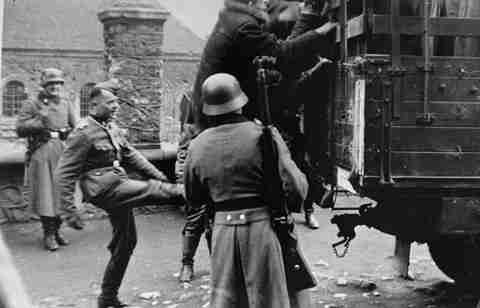
General Rudenko: Let us go to another question: Tell me, what procedure was there for sending on the orders and directives of the OKW to various other government agencies and organs.
Goering: I did not understand the meaning of that question as it came through in translation.
General Rudenko: I would like you to describe the procedure which existed for sending the directives of the OKW to the various units and departments of the Air Force and other organs. How were they distributed?
Goering: If I have understood the question correctly, the procedure was as follows: If an order came from the OKW, addressed to the Air Force, it went through the following channels: If it was a direct order from the Fuehrer and signed by the Fuehrer, the order had to be sent directly to me, the Commander-in-Chief. If it was an order--not actually signed by the Fuehrer, but beginning with the words, "By order of the Fuehrer," or "On the instructions of the Fuehrer"--such an order, according to its importance, would go to the Chief of the General Staff of my Air Force, who, according to the purport and whether it was important, would report it to me verbally. If, however, it dealt with current and departmental matters the order would go immediately and directly to the lower departments concerned without passing through the High Command. It would have been impossible to work otherwise, owing to the very large number of such orders.
General Rudenko: I understand. In connection with this I would like to ask the following: In 1941 the OKW drew up a series of instructions and orders with regard to the conduct of the troops in the East and how they were to treat the Soviet population. These dealt specifically with military jurisdiction in the Barbarossa region--Document C-50, which has already been submitted to the Tribunal. According to these instructions, the German officers had the right to shoot any person suspected of a hostile attitude towards the Germans, without bringing that person to court. This directive also stated that the German soldiers could not be punished for crimes which they committed against the local population. Directives of this nature must have been submitted to you?
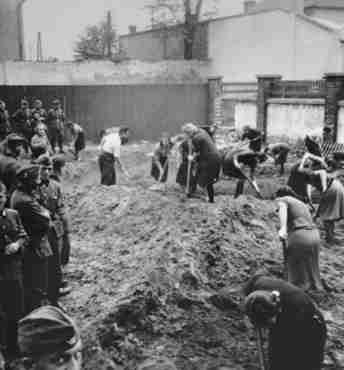
General Rudenko: You would like to see the exhibit?
Goering: I want to see whether that document went straight to me, or only to my departments.
General Rudenko: Please look at the date, 13 May 1941.
Goering: Actually it did not go straight to me. It says on the distribution chart, "Ob. d. L., Air Force Operations Staff, Senior General Staff officer." Actually as far as my troops were concerned, I issued very severe disciplinary orders. That is the reason why I have asked for the senior Judge of the Air Force to be called as a witness, and have now sent him an interrogatory which deals with, these very questions.
General Rudenko: You do know about this order, however?
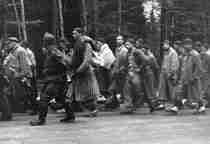
General Rudenko: But you do agree that you must have known about this document because of its importance?
Goering: No, if so, it would have come directly to me, the Commander-in-Chief, and not be sent to the Air Force Operations Staff and the General Staff officers' department. It depended then on whether this department considered the importance of the document to be such as to require my personal orders and directives. But this was not the case here, since the document did not affect us as much as it did the Army.
General Rudenko: But the document was sent to your department and circulated there.
Goering: I have just said it was sent to two offices.
General Rudenko: But this document should have been reported to you.
Goering: No, it did not have to be reported to me. I explained a little earlier that if every order and every instruction which came through in the shape of an order, but which did not require my intervention, would have had to be reported to me, I should have been drowned in a sea of papers; and that is the reason why only the most important matters were brought to me and reported to me.
I cannot swear upon my oath that this document was not reported to me verbally. It is possible. And I formally take responsibility also for my departments.
General Rudenko: I would like you to be more precise about it. You say that the most important things were usually reported to you; correct?
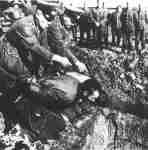
General Rudenko: I would like to draw your attention to the document before you, to the third and fourth paragraphs of the order. The third paragraph says: "Actions of hostile civilians against the German troops or various troop units, as well as against service personnel, must be suppressed on the spot by the most severe measures, even the extermination of the attackers." Paragraph 4: "Thus, no time should be lost..."
Goering: Just a moment.
General Rudenko: The fourth paragraph ...
Goering: You have sent me three documents, and I am trying to find out which one; I am trying to sort them out.
General Rudenko: All right, sort them out.
Goering: I shall repeat Paragraph 3 because it has been transmitted quite erroneously in the German. "Also in the case of all other attacks by hostile civilians against the Armed Forces, their members and service personnel, extreme measures to suppress them must be taken by the troops on the spot, even to the extent of annihilating the attackers."
General Rudenko: And Paragraph 4?
Goering: Then we come to Number 4, and it is, if I understand you correctly, the paragraph where it says: "Where measures of this kind have been omitted or were not practicable at the moment, the suspected elements will be taken at once to an officer who will decide whether they are to be shot." That is probably what you meant, is it not?
General Rudenko: Yes. That is what I had in mind. Could it be assumed that this document, from your point of view, was important enough to have been reported to you?
Goering: Actually it was important, but it was not absolutely necessary for it to be reported, because the order of the Fuehrer bad made it so clear that a subordinate commander, and even a commander-in-chief of one of the services could not alter a clear and strict order of that kind.
General Rudenko: I draw your attention once more to the date in the right-hand corner. It states there, Fuehrer headquarters, 13 May 1941.
Goering: Yes.
General Rudenko: Therefore, it means that this was a month before the German attack on the Soviet Union? Already, then, directives were formulated about military jurisdiction within the regions covered by Case Barbarossa, and you did not know about this document?
Goering: When a plan for mobilization is laid, provision must be made for certain eventualities. From his experience, the Fuehrer believed that a serious threat would immediately arise in the East, and in this document measures are laid down for dealing with any action by the resistance, and fighting behind the lines. It was therefore a precautionary order in case of such happenings. Such measures have to be taken always and at all times.
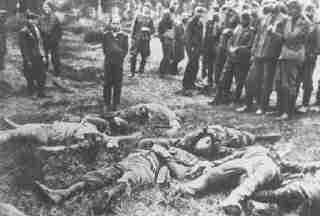
Goering: An officer could hold a court martial on the spot, but, according to this paragraph, he could also, if he thought fit and had evidence that the opponent was making attacks from the rear, have him shot on the spot. That has always been done.
General Rudenko: You think that the officer can hold a court martial on the spot?
Goering: That is laid down in the articles of war. Every officer commanding an independent unit can hold a court martial at any time.
General Rudenko: But you do agree that there is no question of any court here? It states that he alone can decide what to do with the civilian.
Goering: He could act alone or through a court martial, which was on the spot. All he needed to do was to call just two more people, and he could reach a decision, in 2 or 5 minutes if evidence of the attack was given.
General Rudenko: In 5 minutes or 2 minutes, you say, and then he could shoot the person?
Goering: If I catch a man in the act of shooting at my troops from a house in the rear, then the matter can be settled very swiftly by a court martial. But where there is no evidence at all, you cannot do that. Here, however, we are dealing with an immediate attack and with the means of putting an end to it.
General Rudenko: Defendant Goering, let us leave this question. I would only like to point out once more that this directive wag issued by the High Command of the Armed Forces on 13 May 1941, and that this order gives an officer the right to shoot a man without a trial. I suppose you will not deny this. Let us go on.
Goering: Yes, but I deny that emphatically. There is nothing here which says that an officer has the right to shoot a man right away. Let us get this right. It says here--and I repeat it--"Attacks by hostile civilians against the Armed Forces," and then it says, "Where measures of this kind are not practicable at the moment, the suspected elements.. ."--and here is meant "suspected elements" only--are to be brought before the highest officer of the formation there present and he will decide the matter. In other words, it does not say that every officer can decide the fate of any civilian.
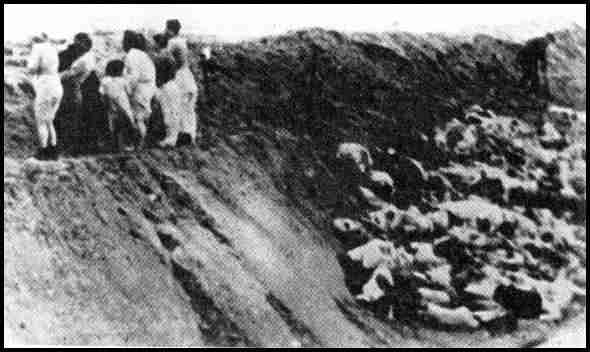
Goering: Just a moment. What was the date you mentioned?
General Rudenko: 16 September 1941 is the date of the document. Point B of the document. I will not quote it. I am merely calling it to your mind. It states that as a general rule the death of one German soldier must be paid for by the lives of 50 to 100 Communists. That means that this rule was to serve as a deterrent. I am not going to question you about the main purport of the document. That is quite clear and needs no clarification. What I am interested in is whether this document was likewise unknown to you.
Goering: It was not directed to me. Here again it merely went to some office. The Air Force had very little to do with such matters.
General Rudenko: And these offices did not report to you about such documents?
Goering: In a general way I knew about these reprisals, but not to this extent. I learned only later--I mean during the war, not here--that the order originally mentioned 5 to 10 and that the Fuehrer personally made it 50 to a 100. The question is whether you have any evidence that the Air Force really made use of the order anywhere, and they did not. That is all I can tell you.
General Rudenko: Do not put questions to me. I am asking you. Did your administrative office ever report to you about this document?
Goering: No, but later on I heard about this document. At a later date.
General Rudenko: What do you mean by a "later date"? Please be more precise.
Goering: I cannot tell you at the moment. It was sometime during the war that I heard that a figure which originally stood at from 5 to 10 had been altered by the Fuehrer personally to 50 to 100. That is what I heard.
General Rudenko: For one German?
Goering: I have just explained to you. That is what I heard. The number was originally 5 to 10 and the Fuehrer personally added on a zero. It was through that fact being once discussed that I learned about the whole matter.
General Rudenko: You mean the Fuehrer added the zeros?
The President: General Rudenko, do you think it is really necessary to go through these documents in such detail? The documents, after all, speak for themselves, and they have already been presented to the Tribunal.
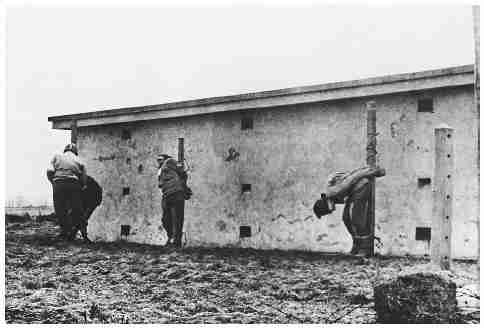
Goering: I shall have to see them.
General Rudenko: If you please, Mr. President, the document has already been submitted to the Tribunal as 33B-PS.
Please look at Point A, Paragraph 3, which states that there is a broad directive concerning the use of arms against Soviet prisoners of war. The use of weapons must be considered permissible and in any incidents involved the guards are not bound to report on the matter. This document also speaks for itself. I do not want ...
Goering: Just a moment, I must read it first; there is some ambiguity in here.
General Rudenko: I should like to refresh your memory with still another subject, that is, a short comment. It is taken from an order concerning the treatment of Soviet prisoners of war. Here it is said that prisoners of war who are trying to escape should be shot without warning. The same subject is also mentioned in the memorandum concerning the treatment of the Russian prisoners of war.
Goering: The trouble here was the language difficulty; hence the guards were instructed to use their arms immediately against persons attempting escape. That is more or less the meaning of it, and that errors might occur in this connection can be understood.
General Rudenko: I am not talking about the purport of the document that speaks for itself. I want to know whether you knew about this document.
Goering: This is a document dealing with the treatment of prisoners of war, and it was passed directly to my department which was concerned with prisoners of war. I did not know of this document, neither did I know of the one which contains the opinion of the Foreign Intelligence Department on the matter.
General Rudenko: You did not know about this document? Very well. Now one other, Number 884-PS, already submitted. It deals with the extermination of political leaders and other political personalities. This is a document ...
Goering: In explanation of this, I should like to point out that the Air Force did not have any camps for Soviet prisoners of war. The Air Force had only six camps in which the air force personnel of other powers were confined; but it had no camps under it with Soviet prisoners of war.
General Rudenko: I have asked you these questions and shown you these documents because as the second man in Germany, you could not possibly have been unaware of these things.
Goering: I apologize if I contradict you. The higher the office I held, the less would I be concerned with orders dealing with prisoners of war. From their very nature, these were departmental orders and not orders of the highest political or military significance. If I had held a much lower rank, then I might have had more knowledge of these orders. I am now looking at the document that you submitted to me--Department of Home Defense. It says on the left, "Reference: Treatment of Captured Political and Military Russian Functionaries." That is the document I am looking at.
General Rudenko: Please look at the date of the document--12 May 1941, Fuehrer's Headquarters.
Goering: Yes.
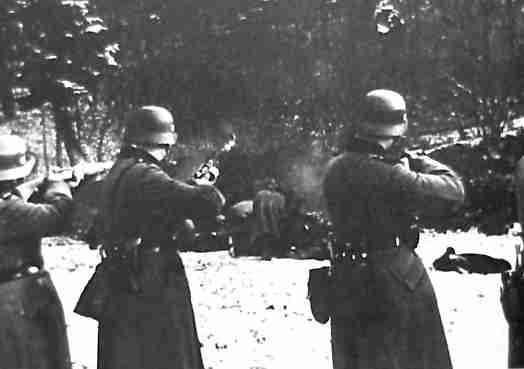
Goering: May I point out that this is in no way a directive, but that it bears the heading, "Memorandum," and is signed Warlimont. Also the distribution chart does not show any other department than the Home Defense Department, which I have mentioned. In other words, this is a memorandum.
General Rudenko: You mean to say then that you did not know about this document?
Goering: I say once more, this is a memorandum from the Operations Staff of the OKW; and it is not an order or a directive, but a memorandum.
The President: That is not an answer to the question. You are telling us what it was, not whether you knew of it.
Goering: No; I did not. It had been put before me as an order, and I wanted to point out that it is not an order.
General Rudenko: Let us go on. The directives regarding the treatment of Soviet prisoners of war must have been executed also by the units of the Luftwaffe?
Goering: If ordered by the Fuehrer, yes; or if ordered by me, also.
General Rudenko: Do you remember your own directives with regard to the treatment of Soviet prisoners of war?
Goering: No.
General Rudenko: You do not remember them?
Goering: The Air Force had no camps with Soviet prisoners of war.
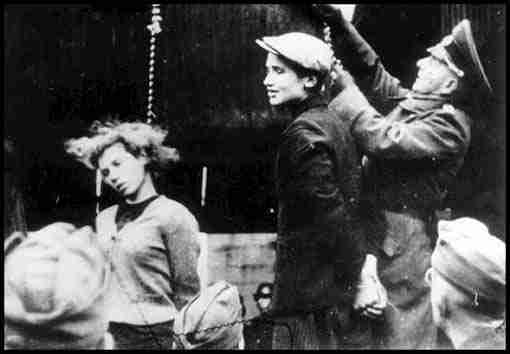
Goering: No. It does not prove it at all. It only shows that we considered a struggle with the Soviet Union would be an extremely bitter one, and that it would be conducted according to other rules as there were no conventions.
General Rudenko: These rules of warfare are well known to us. Please tell me, do you know about Himmler's directives given in 1941 about the extermination of 30 million Slavs? You heard about it from the witness Von dem Bach-Zelewski here in court. Do you remember that?
Goering: Yes. First of all it was not an order but a speech. Secondly, it was an assertion by Zelewski. And thirdly, in all speeches that Himmler made to subordinate leaders, he insisted on the strictest secrecy. In other words, this is a statement from a witness about what he had heard, and not an order. Consequently, I have no knowledge of this nonsense.
General Rudenko: You did not know about it. Very well. Tell me, in the German totalitarian state was there not a governing center, which meant Hitler and his immediate entourage, in which you acted as deputy? These directives must have concerned Keitel and Himmler also. Could Himmler of his own volition have issued directives for the extermination of 30 million Slavs without being empowered by Hitler or by you?
Goering: Himmler gave no order for the extermination of 30 million Slavs. The witness said that he made a speech in which he said that 30 million Slavs must be exterminated. Had Himmler issued such an order de facto, if he kept to regulations, he would have had to ask the Fuehrer--not me, but the Fuehrer -- and the latter would probably have told him at once that it was impossible.
General Rudenko: I did not say it was an order; I said it was a directive from Himmler. You therefore admit, or you state rather, that Himmler could have issued instructions without discussing them with Hitler?
Goering: I emphasize that such instructions could not have been given by Himmler, and I know of no instructions; also no directive has been mentioned here.
General Rudenko: I shall repeat the question once more: Is it not true that the directives and the orders of the OKW with regard to the treatment of the civilian population and prisoners of war in the occupied Soviet territories were part of the general directives for the extermination of the Slavs? That is what I want to know.
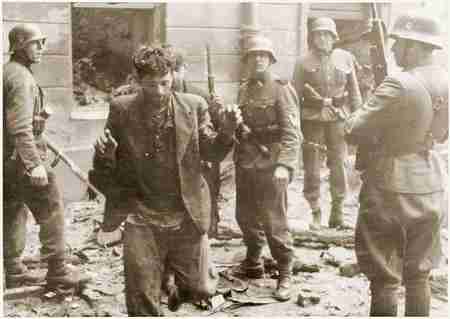
General Rudenko: You must have known about the mass extermination of the Soviet citizens from the occupied territories of the Soviet Union with the help of the SD and the Security Police. Is it not true that the Einsatz Kommandos and their activities were the result of the plan prepared in advance for the extermination of Jews and other groups of Soviet citizens?
Goering: No. Einsatz Kommandos were an internal organ which was kept very secret."
1946 Nuremberg Tribunal: On day 88, Hermann Goering's cross-examination by the prosecution continues.
General Rudenko: I pass on to the following question: It is known to you that there was an order by the OKW regarding the branding of Soviet prisoners of war, and what do you think about that?
Goering: That order is not known to me, and no representative of the Air Force was present at this preliminary discussion as I have ascertained here from the records.
General Rudenko: I am interested as to whether you knew about this or not. The orders are quite clear.
Goering: No.
General Rudenko: Do you know that the German High Command ordered that Soviet war prisoners and Soviet citizens had to be used for clearing mine fields and transporting bombs that had not exploded, et cetera? Do you know about that?
Goering: I know that Russian prisoners of war who were engineers had to clear the mines which they had laid. To what extent the civilian population was employed for that purpose I do not know, but it was possible.
General Rudenko: It is quite clear. Do you know about an order regarding the destruction of the towns of Leningrad, Moscow, and other towns of the Soviet Union?
Goering: In my presence the destruction of Leningrad was discussed only in the document which was mentioned yesterday, in the sense that the Finns, in case of the capture of Leningrad, would have no use for such a big city. Of the destruction of Moscow I know nothing at all.
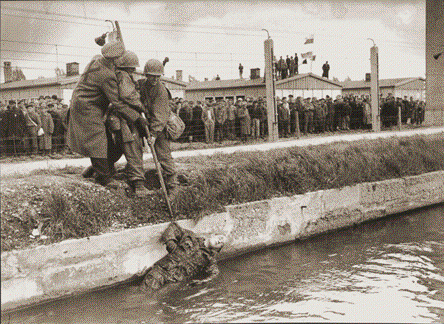
Goering: I have just mentioned and confirmed that.
General Rudenko: Did you speak about this same document? But, besides this statement, there were also official orders.
Goering: Would you be good enough to put them before me, then I would be able to ascertain whether they are correct and whether they were known to me.
General Rudenko: I have no intention of submitting these documents to you. They have already been submitted to the Tribunal. I am interested only as to whether you were aware of these orders.
Goering: I received no order to destroy Leningrad or Moscow in the sense that you have indicated.
General Rudenko: All right. You were told only about the important happenings. But orders for the destruction of cities, and murder of millions of men, et cetera, went through so-called service channels.
Goering: If a town was to have been destroyed by bombing, then that order would have been given by me directly.
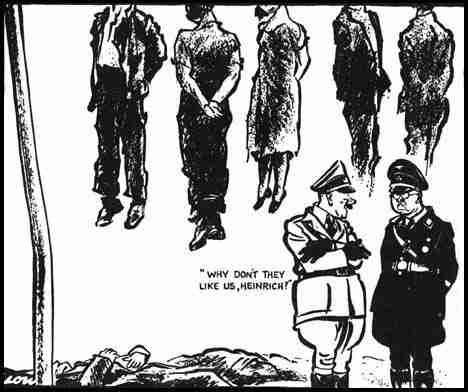





The Nuremberg Tribunal Biographies
Caution: As always, these excerpts from trial testimony should not necessarily be mistaken for fact. It should be kept in mind that they are the sometimes-desperate statements of hard-pressed defendants seeking to avoid culpability and shift responsibility from charges that, should they be found guilty, can possibly be punishable by death.
Disclaimer:The Propagander!™ includes diverse and controversial materials--such as excerpts from the writings of racists and anti-Semites--so that its readers can learn the nature and extent of hate and anti-Semitic discourse. It is our sincere belief that only the informed citizen can prevail over the ignorance of Racialist "thought." Far from approving these writings, The Propagander!™ condemns racism in all of its forms and manifestations.
Source Note: The trial portion of this material, which is available in its entirety at the outstanding Avalon and Nizkor sites, is being presented here in a catagorized form for ease of study and is not meant to supplant or replace these highly recommended sources.
Fair Use Notice: This site--The Propagander!™--may contain copyrighted material the use of which has not always been specifically authorized by the copyright owner. We are making such material available in our efforts to advance understanding of historical, political, human rights, economic, democracy, scientific, environmental, and social justice issues, etc. We believe this constitutes a "fair use" of any such copyrighted material as provided for in section 107 of the US Copyright Law. In accordance with Title 17 U.S.C. Section 107, the material on this site is distributed without profit to those who have expressed a prior interest in receiving the included information for research and educational purposes. If you wish to use copyrighted material from this site for purposes of your own that go beyond 'fair use', you must obtain permission from the copyright owner.

